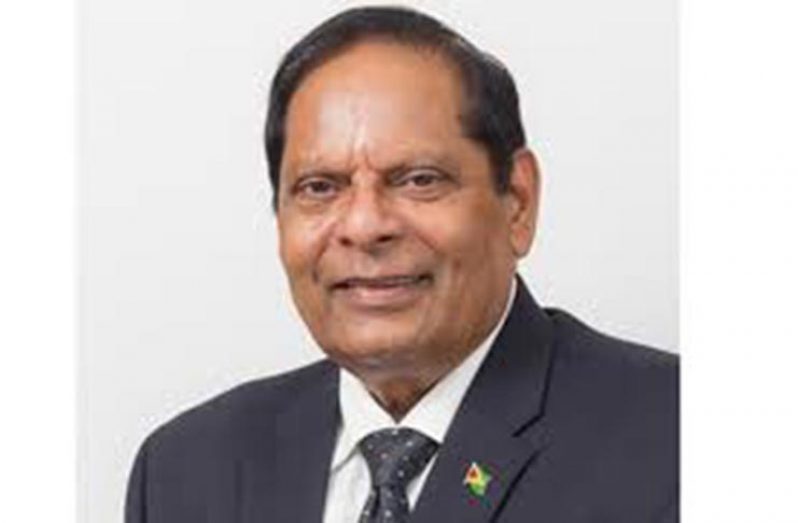– thanks to the work of the ‘Gang of Eight’, says Nagamootoo
PRIME Minister Moses Nagamootoo took a dim look at the PPP “Gang of Eight” in his weekly column on Sunday which he said “mocks at inner-party democracy” and has, for years, been a means of “manipulating political processes”.
In his weekly column, ‘My Turn’, Nagamootoo took time to explain the “Gang of Eight” concept which he said, has existed since the post-Jagan People’s Progressive Party (PPP) period.
Nagamootoo said that a congress of delegates would elect 35 persons to sit on the Central Committee of the PPP and these persons, usually a week after congress, would then meet to elect a 15-member Executive Committee.
The “Gang of Eight” is a political concept in the PPP that represents a “built-in majority” of eight persons where the decision-making body comprises 15 persons,” Nagamootoo enlightened.
He further described this “Gang of Eight” as a “revolving door” whereby persons are changed out and rotated, based on whether they are seen as loyal to a particular leader or give support to certain political decisions from time to time.
“Historically, leaders were thrown out from the party’s inner core, mainly due to tactical or strategic shifts and ideological differences, but the persons who were purged were invariably branded ‘opportunists’,” Nagamootoo expounded.
He went on to state that with the absence of a strong leader for the post-Jagan PPP, the “Gang of Eight” became a “weapon of manipulation and control” as the struggle for a position on the 35-member Central Committee “degenerated into character assassinations”.
“In my case, having emerged at the top two with the highest numbers of votes at the 1998 congress, a simple majority of 18 members voted against me. I was removed from the Executive Committee, after being continuously a member for 20 years. I had openly denounced my exclusion as ‘stalinist’, reminiscent of the purges that took place under the Russian communist dictator.
“The idea is to sanitise the Executive Committee, by making sure that a simple majority of eight out of the 15 members would support the ‘maximum leader’. “The built-in majority would be decisive in a situation where the Executive Committee had to ‘recommend’ a person or persons to be a presidential candidate,” he stated.
It is the same formation of a “Gang of Eight” that Nagamootoo said recommended Bharrat Jagdeo, who is now the “premier parliamentary speaker on national issues” although he can no longer run for president.
PITCH-FORKED
And while as president, Nagamootoo said that Jagdeo deployed similar tactics when he “pitch-forked Donald Ramotar to the top of a slate of potential candidates”.
Protests later came in 2010 from then senior party executive, Ralph Ramkarran, who objected when Ramotar “prematurely announced his candidacy”, was placed on the Guyana Sugar Corporation (GuySuCo) Board and was permitted presidential luxury trips to China, Kuwait and India.
Nagamootoo noted some of the many “expulsions” of the executive committee included ‘ultra-left deviationists’ like Martin Carter, Rory Westmaas, Sydney King and Moses Bhagwan and ‘right opportunists’ like L.F.S. Burnham and Jai Narine Singh.
He also recalled the attempts in 1976 to rig the PYO elections with aims to overthrow Halim Majeed, his brother Zaheer, Odeen Ishmael and himself.
This, however, was curbed following collective advocacy for talks and rapprochement between Cheddi Jagan and Forbes Burnham.
Nagamootoo said that it was around this period that the “biggest exodus of leftwingers took place” as former PPP supporters such as Ranji Chandisingh, Vincent Teekah and Lallbahadur Lalbachan, defected to Burnham’s People’s National Congress (PNC).
“The fallouts occurred mainly as a result of failure of the inner-party political processes to handle political or ideological and sometimes personality differences. That was the reason I was foremost in my advocacy to broaden the shoulders of the party to avoid one-man dictatorship and to cleanse the party of reliance on unacceptable practices to entrench a ‘Gang of Eight’.
“But the quest for personal power had become insatiable, and it would continue to devour some of the finest intellectuals and progressive leaders this country has produced. In the post-Jagan PPP, political life could be cruel, brutal and short,” he said.
In 2011, Nagamootoo resigned from the PPP after 50 years of service, telling reporters that “This is not the party I used to know.”
Nagamootoo joined the Alliance for Change (AFC) in October 2011, and following the joint partnership with the A Partnership for National Unity (APNU), he became Prime Minister after the coalition won the 2015 General and Regional Elections.





.jpg)








